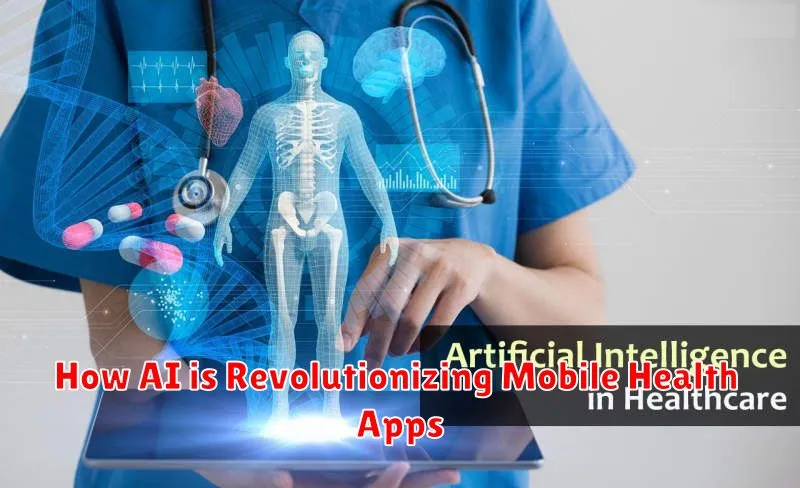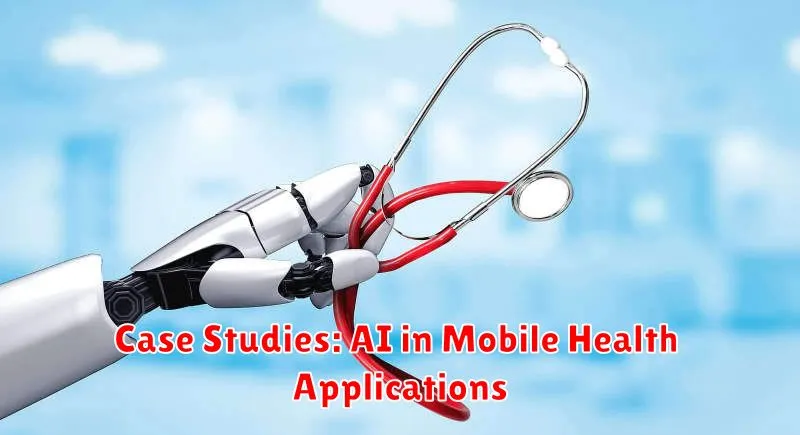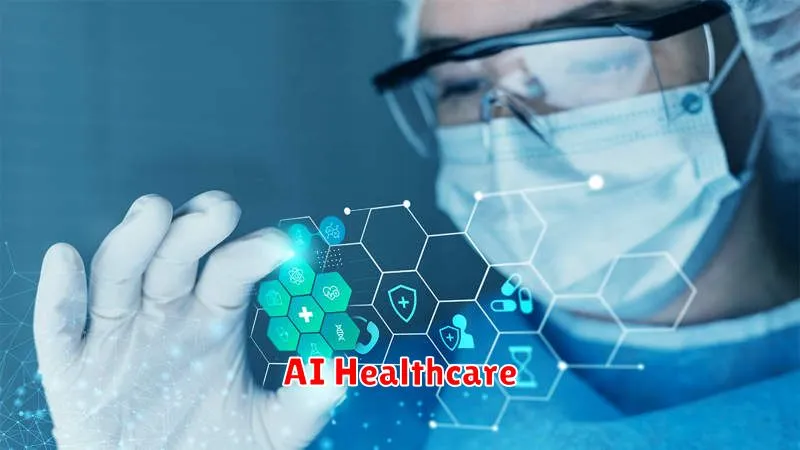The healthcare landscape is rapidly evolving, and artificial intelligence (AI) is at the forefront of this transformation. From diagnosing diseases to personalizing treatment plans, AI is revolutionizing the way we approach mobile healthcare. As technology continues to advance, the integration of AI in mobile health applications is becoming increasingly sophisticated, offering unparalleled benefits to both patients and healthcare providers.
This article delves into the growing role of AI in mobile healthcare, exploring the latest advancements and their impact on the industry. We’ll discuss the key benefits of AI-powered mobile health solutions, including improved accuracy, efficiency, and accessibility. We’ll also examine the challenges and ethical considerations surrounding AI in healthcare, ensuring a comprehensive understanding of this transformative technology.
How AI is Revolutionizing Mobile Health Apps

Artificial intelligence (AI) is rapidly changing the healthcare landscape, and mobile health apps are no exception. AI-powered mobile health apps are becoming increasingly sophisticated, offering users a wide range of benefits, from personalized health recommendations to early disease detection. Here’s how AI is revolutionizing mobile health apps:
Personalized Health Recommendations: AI algorithms can analyze data from wearable devices, medical records, and user input to provide tailored health advice. This includes personalized exercise routines, nutrition plans, and medication reminders.
Early Disease Detection: AI can analyze images, sounds, and other data to identify potential health problems early on. For example, AI-powered apps can detect skin cancer from photos, analyze heart sounds for abnormalities, and predict the risk of diabetes based on user data.
Virtual Assistants: AI-powered chatbots and virtual assistants can provide instant support and answer basic health questions. They can also schedule appointments, remind users to take medication, and provide access to relevant medical information.
Improved Diagnosis and Treatment: AI can assist doctors in making more accurate diagnoses and developing more effective treatment plans. By analyzing large datasets of patient information, AI algorithms can identify patterns and predict outcomes, leading to better decision-making.
Enhanced Patient Engagement: AI-powered mobile health apps can make healthcare more accessible and engaging for patients. They can provide real-time feedback on user progress, track health metrics, and encourage healthy habits through gamification and personalized rewards.
As AI continues to advance, we can expect to see even more innovative mobile health apps that improve patient care and empower individuals to take control of their health.
The Benefits of AI in Healthcare Monitoring
Artificial intelligence (AI) is rapidly transforming the healthcare industry, particularly in the realm of mobile healthcare. AI-powered tools and applications are providing numerous benefits in healthcare monitoring, revolutionizing how patients manage their health and how medical professionals provide care.
Enhanced Accuracy and Efficiency: AI algorithms can analyze vast amounts of data from various sources, including wearable devices, medical records, and patient feedback, to identify patterns and anomalies that may go unnoticed by human observation. This enhanced accuracy and efficiency lead to early detection of health issues, enabling timely interventions and potentially preventing complications.
Personalized Care: AI enables tailored treatment plans based on individual patient characteristics, such as medical history, lifestyle, and genetic predispositions. Personalized care plans improve treatment outcomes, reduce side effects, and enhance patient satisfaction.
Proactive Monitoring: AI-powered apps and devices can continuously monitor vital signs, medication adherence, and other key health indicators. This proactive monitoring allows for early intervention in case of potential health risks, preventing complications and reducing hospital readmissions.
Remote Patient Monitoring: AI facilitates remote patient monitoring, enabling healthcare providers to track patients’ health remotely and intervene in real-time. This reduces the need for frequent clinic visits and empowers patients to manage their health more effectively.
Improved Diagnosis and Treatment: AI algorithms can analyze medical images, such as X-rays and MRIs, with greater accuracy than human specialists. This assists physicians in making faster and more precise diagnoses, leading to more effective treatment plans.
Cost Reduction: AI-powered healthcare monitoring systems can streamline processes, reduce administrative burdens, and optimize resource allocation, ultimately leading to cost savings for both patients and healthcare providers.
The benefits of AI in healthcare monitoring are undeniable, offering improved accuracy, personalized care, proactive monitoring, and cost reduction. As AI technology continues to evolve, we can expect even more innovative applications in mobile healthcare, revolutionizing how we manage our health and access care.
AI-Powered Diagnostic Tools on Mobile Devices
The realm of mobile healthcare is rapidly evolving, with AI-powered diagnostic tools emerging as a game-changer. These tools leverage the power of artificial intelligence to analyze medical data, assist in diagnoses, and provide personalized health insights right on your smartphone. Imagine a world where you can monitor your health, detect potential problems, and receive preliminary diagnoses all from the convenience of your mobile device. This is the reality that AI-powered diagnostic tools are bringing to fruition.
How do these tools work? They utilize machine learning algorithms trained on vast datasets of medical records, images, and other health information. This enables them to identify patterns, make predictions, and provide valuable insights for healthcare professionals. For example, AI algorithms can analyze images of skin lesions to detect potential signs of skin cancer, analyze electrocardiograms to identify heart abnormalities, or even interpret patient symptoms to suggest possible diagnoses.
The benefits are numerous:
- Early Detection: AI tools can help identify potential health issues at an early stage, when interventions are most effective.
- Improved Accuracy: By leveraging vast datasets and advanced algorithms, AI can often provide more accurate diagnoses than traditional methods.
- Increased Accessibility: Mobile devices make healthcare more accessible, especially in remote areas or for individuals with limited mobility.
- Personalized Care: AI algorithms can analyze individual health data to provide tailored recommendations and treatment plans.
While these tools offer tremendous promise, it’s crucial to remember that they are not replacements for professional medical advice. They are designed to assist healthcare providers, not to diagnose or treat conditions independently. Always consult with a qualified doctor before making any health-related decisions based on information from AI-powered tools.
The future of mobile healthcare is bright, with AI-powered diagnostic tools paving the way for a more accessible, personalized, and proactive approach to health management. As these technologies continue to evolve, we can expect even more innovative applications that will revolutionize the way we interact with our health and well-being.
Security and Privacy Concerns in AI Healthcare Apps
While AI offers vast potential in mobile healthcare, it also introduces new security and privacy concerns. The use of AI in healthcare involves collecting and analyzing sensitive patient data, such as medical records, personal information, and even biometric data. This raises concerns about the potential for data breaches, misuse, and unauthorized access.
One major concern is the security of the data itself. AI algorithms often require large datasets to train effectively, and these datasets can be vulnerable to cyberattacks and data breaches. If this data falls into the wrong hands, it could lead to identity theft, financial loss, or even harm to patients.
Another crucial concern is patient privacy. AI systems often use data from multiple sources, including hospitals, insurance companies, and even personal devices. This data needs to be carefully anonymized and secured to prevent unauthorized access and disclosure.
Furthermore, there are concerns about the transparency and explainability of AI algorithms. These algorithms can be complex and difficult to understand, making it challenging to ensure their fairness and accuracy. This lack of transparency can lead to biased outcomes and raise ethical questions about accountability and decision-making processes.
As AI plays an increasingly significant role in mobile healthcare, addressing these security and privacy concerns is crucial. Robust security measures, data encryption, privacy-preserving techniques, and clear regulations are essential to protect patient data and ensure the ethical and responsible use of AI in healthcare.
Future Trends in Mobile Healthcare with AI
The healthcare industry is undergoing a significant transformation driven by the rapid advancements in artificial intelligence (AI). Mobile healthcare, in particular, is poised to benefit immensely from AI’s capabilities, offering personalized and efficient care solutions. As we move forward, several exciting trends are emerging that will shape the future of mobile healthcare with AI.
Personalized Treatment Plans: AI-powered mobile applications can analyze patient data, including medical history, lifestyle, and real-time health metrics, to create personalized treatment plans. This tailored approach optimizes medication management, promotes healthy habits, and improves overall health outcomes.
Remote Patient Monitoring: Wearable devices and mobile applications equipped with AI can continuously monitor vital signs, such as heart rate, blood pressure, and sleep patterns. This real-time data enables early detection of health issues, facilitates remote patient monitoring, and reduces the need for frequent hospital visits.
Virtual Assistants and Chatbots: AI-powered virtual assistants and chatbots can provide instant medical advice, answer common health questions, and schedule appointments, enhancing patient convenience and access to healthcare information. These virtual assistants can also serve as reminders for medication intake, follow-up appointments, and other health-related tasks.
AI-Driven Diagnostics: AI algorithms are being trained to analyze medical images, such as X-rays, MRIs, and CT scans, to assist in early and accurate diagnosis of diseases. Mobile applications leveraging AI can provide physicians with valuable insights and support in making informed decisions.
Drug Discovery and Development: AI is revolutionizing drug discovery and development by identifying potential drug candidates and optimizing clinical trials. Mobile applications can be used to collect and analyze data from patients participating in clinical trials, accelerating the research process and bringing new treatments to market faster.
Case Studies: AI in Mobile Health Applications

Artificial intelligence (AI) is transforming the healthcare industry, and mobile health (mHealth) apps are at the forefront of this revolution. AI-powered mHealth apps are changing how we manage health conditions, access care, and improve overall well-being.
Here are some compelling case studies demonstrating the impact of AI in mobile health applications:
1. Diabetes Management with AI
Livongo Health is a leading example of an AI-powered mHealth app for diabetes management. The app uses AI algorithms to analyze users’ blood sugar data, provide personalized insights, and offer real-time feedback and support. Livongo has been shown to significantly improve blood sugar control, reduce healthcare costs, and enhance patient engagement.
2. Mental Health Support Through AI Chatbots
Woebot is a mental health chatbot that utilizes AI to provide cognitive behavioral therapy (CBT) and emotional support. The chatbot engages in conversations with users, helping them identify negative thought patterns, develop coping mechanisms, and manage stress and anxiety. Woebot has shown promising results in reducing symptoms of depression and anxiety.
3. AI-Powered Medical Imaging Analysis
Butterfly Network has developed a handheld ultrasound device that uses AI to analyze images and provide real-time diagnoses. The device can be used by medical professionals in various settings, including hospitals, clinics, and even remote areas, improving access to diagnostic services. AI-powered image analysis helps doctors identify abnormalities and make faster and more accurate diagnoses.
These are just a few examples of how AI is revolutionizing mobile healthcare. As the technology continues to advance, we can expect even more innovative and impactful AI-powered mHealth apps to emerge, ultimately improving the quality and accessibility of healthcare for everyone.

